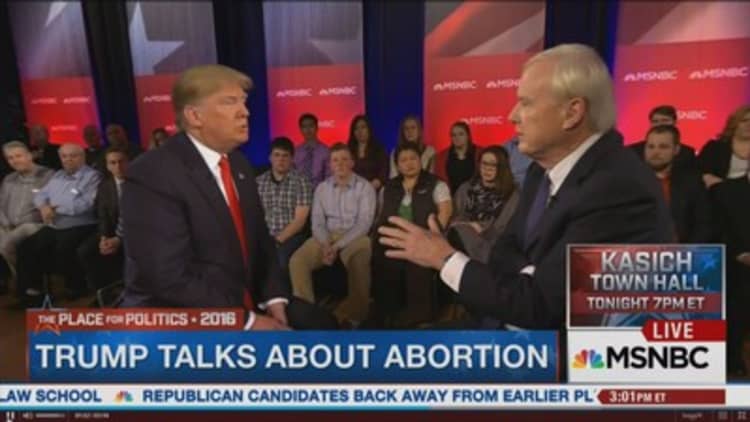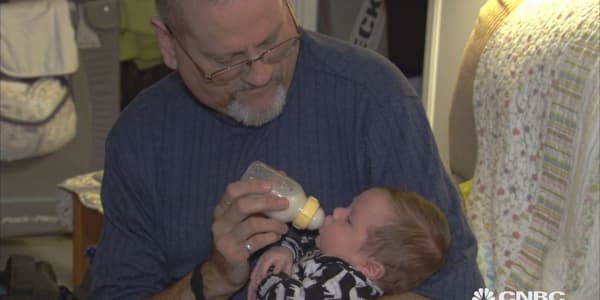On a typical day, two protesters stand outside Choices Women's Medical Center in Jamaica, New York. The man hands out antiabortion flyers; a nun passes out rosary beads. For the most part, things are calm. Since Nov. 8, that is no longer the case.
Since the election, aggressive protesters have been flocking to the clinic, which provides abortions as well as gynecology, prenatal services and STD testing. On Saturdays dozens of protesters spread out half a block in either direction of the doorway, holding signs, screaming at women entering the clinic and impeding on the 15-foot buffer they are legally required to adhere to beyond the clinic doors.
"Their behavior has become incredibly more aggressive to the point we've had to call the police the last three to four weeks," said Camille Barbone, vice president of operations at the clinic. "There's much more condemnation than I've ever seen before. They're pushing cellphone cameras into patients' faces."
Other abortion providers across the country have seen even more aggressive tactics since election night. A clinic in Kentucky had to replace its windows after a protester threw rocks through them, and a clinic in North Carolina saw 2,500 protesters on one day — more than double the number it's accustomed to — holding Trump/Pence signs saying, "We won, you lost."
Online threats against abortion providers in November more than tripled the yearly average, said Vicki Saporta, president of the National Abortion Federation.
Many abortion advocates attribute the increased aggression to the victory of President-elect Donald Trump, who brought renewed attention to the abortion issue during his campaign by describing the procedure in graphic, medically dubious terms and suggesting women should be punished for seeking them.

Providers fear the rise in threats will continue as Trump appoints Cabinet members who could usher in an era of hostility for women's reproductive rights, galvanizing the anti-abortion movement.
"I think we are facing the fight of our lives," said Jennifer Dalven, director of the ACLU's Reproductive Freedom Project.
The president's men
Vice President-elect Mike Pence authored the first bill to strip all federal money from Planned Parenthood during his time in Congress and has signed multiple anti-abortion bills into law as governor of Indiana, including an unprecedented measure to ban abortion in cases of genetic abnormality.
Jeff Sessions, a Republican Senator from Alabama and Trump's nominee for Attorney General, has advocated for defunding organizations that perform abortions, supported bans on various abortion procedures and voted against a security and safety fund for women's health-care clinics.
Georgia Rep. Tom Price, the nominee for Health and Human Services Secretary, has ardently opposed abortion and the Affordable Care Act's no-cost birth control mandate, saying there is not one woman who cannot afford contraception.
None of the officials returned requests for comments.
In his first post-election interview with "60 Minutes," Trump said he would appoint "pro-life judges" to the Supreme Court and if Roe vs. Wade is overturned, "Yeah. Well, perhaps they have to go to another state," he said of women seeking an abortion.
Reproductive rights advocates are anticipating new challenges at the state level, with many states using Trump's election as a mandate to proceed with anti-abortion laws.
The Ohio legislature recently proposed a "heartbeat bill," which would have banned abortion from the moment the heartbeat of a fetus can be detected. Legislators did so on the presumption that Trump would appoint conservative Supreme Court justices who would uphold such a law.
However, Ohio Gov. John Kasich vetoed the heartbeat measure Tuesday, saying it contradicted the court's current rulings on abortion. He did sign into law a ban on abortion after 20 weeks of pregnancy without exceptions for rape or incest, a measure abortion advocates consider extreme.
"We're both under threat at the state and national level," said Nikki Madsen, executive director of the Abortion Care Network. "With a Republican president, Republican-majority legislature and the potential for multiple Supreme Court appointments, in some ways we're entering uncharted territory."
A post-election spike in threats
In the 30 days after the election, online threats against abortion providers jumped 46 percent compared to the 30 days prior, according to the National Abortion Federation, which monitors commentary about abortion on social media, blogs and other websites. President Vicki Saporta said rhetoric from leaders at the top is driving this change.
"I think it's become more acceptable to espouse threats," she said. "You have a president-elect who is leading the way."
Virtual threats are not without real consequences. In the past, rises in online vitriol against abortion providers have coincided with arson, bombings and murders, including the shooting of three at a Planned Parenthood clinic in Colorado last year.
"You can't whip up a firestorm of hate and not think it has any consequences," Saporta said.
When the National Abortion Federation detects a direct threat online (aimed at a specific clinic or provider rather than a generic threat to all), it reports the source to the U.S. Department of Justice's Task Force on Violence Against Health Care Providers. The task force, created by Attorney General Janet Reno in 1998, investigates and prosecutes incidents of abortion violence and works with local law enforcement to ensure the safety of providers.
Sometimes local law enforcement officers will be lenient with protesters who violate the buffer zone, vandalize clinics or act aggressively because they view the actions as political rather than criminal, Saporta said. At times like these, it's important to have the task force and the attorney general's office as avenues of recourse.
Saporta fears that may not be the case for long, though, if Sessions becomes attorney general.
"We are concerned if we have an AG who thinks Operation Rescue is a legitimate organization and takes cues from them versus understanding that the law is the law and it needs to be enforced," Saporta said.
The task force could not provide an official for comment by press time.
You can't whip up a firestorm of hate and not think it has any consequences.Vicki Saportapresident, National Abortion Federation
Operation Rescue, an anti-abortion Christian organization, celebrated Sessions' nomination and offered to help the new attorney general with any potential prosecutions of Planned Parenthood for alleged crimes including "covering up sex abuse perpetrated by abortion clinic staff."
"Planned Parenthood's days of running amok over the laws of the land are nearly over," the group's president Troy Newman said in a statement. "A new sheriff is coming to town and the era of old corrupt politicians who have shielded Planned Parenthood from the consequences of their illegal behavior is about to come to an end."
Fighting back
Abortion clinic protesters are not the only ones stepping up their actions since the election. Abortion supporters are also donating their time and money with a renewed sense of urgency.
In the days after the election, Planned Parenthood received more than 260,000 donations, a quarter of whom pledged to be monthly supporters. More than 72,000 of those donations were made in Mike Pence's name.
"We are so grateful to this community across the country, and we will never stop fighting for them," Planned Parenthood President Cecile Richards said in a statement. "We've stood defiant in the face of opposition for the last 100 years. We will never back down, and we will never stop providing the care our patients need. These doors stay open, no matter what."
The Center for Reproductive Rights also saw an influx of funds, collecting 2000 percent more than the average monthly revenue in donations during November. Nearly 90 percent of those funds came from first-time donors.
Many clinics are seeing an increase in people offering to help, whether it be in the office or serving as escorts for women entering the facility. One abortion clinic received 80 volunteer applications in the week after the election, when it normally receives 20 applications in a year. Another saw a 300 percent increase in volunteers.
Abortion advocates say this support makes it clear that the election was not a referendum on abortion. A Gallup poll conducted as recently as May found the majority of Americans support abortion in at least some circumstances.
"We will be working to get those voices out there to make sure politicians know what their constituents want," said Jennifer Dalven, director of the ACLU's Reproductive Freedom Project.
More from Modern Medicine:
Answering this one question could save the lives of 1 million babies
Chinese first to test CRISPR gene editing in humans
This doctor is recreating toys for disabled kids with help from Mattel
But abortion advocates know they have a long four years ahead. For providers like Camille Barbone in New York that means accepting the idea that aggressive protesters are here to stay.
"Most of the time when we've had upticks in protesters, everything settles back down," she said, "but we haven't seen that happen since the election. I'm feeling that it's going to be here for a while."
— By Aneri Pattani, special to CNBC.com




